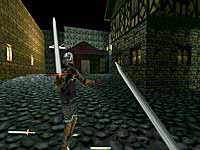 It being Christmas time and all,
I’d been looking forward to indulging one of my personal holiday traditions: whipping
up a bowl of wassail and rereading Dickens’ Oliver Twist. After all,
there’s something decidedly Christmas-y about any tale in which a destitute orphan
rises through ranks of urchin pickpockets, endures poverty, depravity and exploitation
only to get everything he wants—a mom and dad and free room and board. This year, I
thought it might build some character to put a new spin on the annual ritual and get a
more authentic feel for what goes on in the book. Yes, this year I would become
Twist and try to see the world from his point of view, bruises and all. Instead of picking
pockets and artful dodging, though, I grabbed a flaming bowl of plum pudding and sat down
with Thief: The Dark Project, Eidos’ latest action title. Of course, it became
clear from the very start that this game had little in common with Twist. Indeed,
while the world depicted in Thief is as creepy and sinister as anything Dickens
cooked up for Fagin’s den of thieves, there is nothing sentimental about it. Then
again, I don’t think Dickens intended to offer his audience the Victorian-era
equivalent of one of the best written, looking and sounding multimedia action
gaming experiences ever released. It being Christmas time and all,
I’d been looking forward to indulging one of my personal holiday traditions: whipping
up a bowl of wassail and rereading Dickens’ Oliver Twist. After all,
there’s something decidedly Christmas-y about any tale in which a destitute orphan
rises through ranks of urchin pickpockets, endures poverty, depravity and exploitation
only to get everything he wants—a mom and dad and free room and board. This year, I
thought it might build some character to put a new spin on the annual ritual and get a
more authentic feel for what goes on in the book. Yes, this year I would become
Twist and try to see the world from his point of view, bruises and all. Instead of picking
pockets and artful dodging, though, I grabbed a flaming bowl of plum pudding and sat down
with Thief: The Dark Project, Eidos’ latest action title. Of course, it became
clear from the very start that this game had little in common with Twist. Indeed,
while the world depicted in Thief is as creepy and sinister as anything Dickens
cooked up for Fagin’s den of thieves, there is nothing sentimental about it. Then
again, I don’t think Dickens intended to offer his audience the Victorian-era
equivalent of one of the best written, looking and sounding multimedia action
gaming experiences ever released.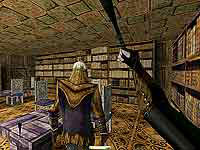 First
of all, Thief--unlike most of the 3D shooters it might initially be mistaken
for--is not a shoot-‘em-up extravaganza featuring some anatomically ridiculous hero
who defies physics, the law of averages and karmic cycles while obliterating mutants,
techno-monstrosities and civilizations in his wake. In fact, Thief holds little
truck with games characterized by lots of noise and action, which isn’t to say that
it lacks these qualities. This game offers plenty of action, most of it of the
sweaty-palmed, hair-raising variety. Yet Thief demands that players exercise
stealth, silence and economy of action in order to proceed through the game. Players stand
a better chance of sticking around if they choose the surfaces upon which they walk,
proceed slowly, and stick to the shadows. In addition, Thief is one of the only
action titles I can think of which rewards players for patience and thoroughness and
encourages players to cover their tracks. So when players sneak up behind surly manor
guards or fanatical zealots and blackjack them, for instance, it is crucial to dump the
body--in a dark corner, behind a column, in the sewer--lest a passerby discover the crime
and start screaming, literally, bloody murder. First
of all, Thief--unlike most of the 3D shooters it might initially be mistaken
for--is not a shoot-‘em-up extravaganza featuring some anatomically ridiculous hero
who defies physics, the law of averages and karmic cycles while obliterating mutants,
techno-monstrosities and civilizations in his wake. In fact, Thief holds little
truck with games characterized by lots of noise and action, which isn’t to say that
it lacks these qualities. This game offers plenty of action, most of it of the
sweaty-palmed, hair-raising variety. Yet Thief demands that players exercise
stealth, silence and economy of action in order to proceed through the game. Players stand
a better chance of sticking around if they choose the surfaces upon which they walk,
proceed slowly, and stick to the shadows. In addition, Thief is one of the only
action titles I can think of which rewards players for patience and thoroughness and
encourages players to cover their tracks. So when players sneak up behind surly manor
guards or fanatical zealots and blackjack them, for instance, it is crucial to dump the
body--in a dark corner, behind a column, in the sewer--lest a passerby discover the crime
and start screaming, literally, bloody murder.
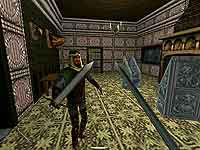 On the other hand, if players can make it through the
twelve missions by killing as few adversaries as possible, they stand better chances of
successfully fulfilling their directives; the expert level of the game requires players to
avoid physical contact with other characters at all costs. Players need to keep in mind,
too, that they have very limited health supplies--and the difficulty of procuring healing
potions lends this game a sometimes frustrating verisimilitude. The first few times I
played the game, I met my end several times because I was sloppy and left
evidence—open doors, knocked-over goblets and up-turned dishes, cadavers—in my
wake. When I finally got in the habit of erasing my trail, however, I was disappointed to
notice one of the only weaknesses of this game. Namely, after dumping a stiff into a
wooden chest and closing the lid, I was chagrined to spy the victim’s arms and legs
radiating from the container. It was as though the chest sprouted limbs; for a second, I
wasn’t sure if this werebox was a new species of villain to be blackjacked or not. As
it turned out, this situation was simply the first instance of clipping problems that
occur throughout Thief. On the other hand, if players can make it through the
twelve missions by killing as few adversaries as possible, they stand better chances of
successfully fulfilling their directives; the expert level of the game requires players to
avoid physical contact with other characters at all costs. Players need to keep in mind,
too, that they have very limited health supplies--and the difficulty of procuring healing
potions lends this game a sometimes frustrating verisimilitude. The first few times I
played the game, I met my end several times because I was sloppy and left
evidence—open doors, knocked-over goblets and up-turned dishes, cadavers—in my
wake. When I finally got in the habit of erasing my trail, however, I was disappointed to
notice one of the only weaknesses of this game. Namely, after dumping a stiff into a
wooden chest and closing the lid, I was chagrined to spy the victim’s arms and legs
radiating from the container. It was as though the chest sprouted limbs; for a second, I
wasn’t sure if this werebox was a new species of villain to be blackjacked or not. As
it turned out, this situation was simply the first instance of clipping problems that
occur throughout Thief.
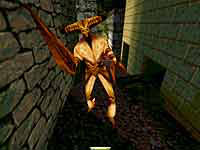 In Thief, players assume the persona of Garrett, a petty
crime-committing street punk turned master thief who steals from the stinking rich
nobility and merchants of the City and gives the wealth he acquires to … himself. One
of the most entertaining aspects of this game is the protagonist’s cynical
personality, which emerges throughout play as Garrett offers his opinions on the
pretensions of the bourgeoisie, the frightening zealotry of the
religious-military-industrial complex (the Hammers), or the eerie supernatural currents
that run throughout the story (the Undead, the Leaf-man). Upon entering a book-lined
library in a lord’s manner, for example, Garret observes: "I wonder if he reads
them, or if they’re just there for show." This intermittent editorializing
enriches the game on many levels. It supports for players the illusion that the game
occurs in real time in a real place. It also reminds players of the larger narrative of
the spiritual war raging between the technologically puritanical Hammers and the chthonic
impulses manifested by the Leaf-man and his minions that frame Garrett’s adventures.
And finally, his voice sensitizes players to the sound of this game. At times, after
lurking in silence and listening for awhile, Garrett’s wry voice shatters a
player’s concentration to the extent that I often found myself running from or
ducking in shadows at the sound of this character’s speech. While unsettling, these
unexpected asides provide a sort of hilarious release. Indeed, in the end, it is Thief’s
sound that finally steals the show from Garrett. In Thief, players assume the persona of Garrett, a petty
crime-committing street punk turned master thief who steals from the stinking rich
nobility and merchants of the City and gives the wealth he acquires to … himself. One
of the most entertaining aspects of this game is the protagonist’s cynical
personality, which emerges throughout play as Garrett offers his opinions on the
pretensions of the bourgeoisie, the frightening zealotry of the
religious-military-industrial complex (the Hammers), or the eerie supernatural currents
that run throughout the story (the Undead, the Leaf-man). Upon entering a book-lined
library in a lord’s manner, for example, Garret observes: "I wonder if he reads
them, or if they’re just there for show." This intermittent editorializing
enriches the game on many levels. It supports for players the illusion that the game
occurs in real time in a real place. It also reminds players of the larger narrative of
the spiritual war raging between the technologically puritanical Hammers and the chthonic
impulses manifested by the Leaf-man and his minions that frame Garrett’s adventures.
And finally, his voice sensitizes players to the sound of this game. At times, after
lurking in silence and listening for awhile, Garrett’s wry voice shatters a
player’s concentration to the extent that I often found myself running from or
ducking in shadows at the sound of this character’s speech. While unsettling, these
unexpected asides provide a sort of hilarious release. Indeed, in the end, it is Thief’s
sound that finally steals the show from Garrett.
Thief’s sound will blow away everyone who plays it;
the way this game sounds stuns everyone I’ve forced to listen to it. Anyone who plays
video and computer games knows that sound and music can make a game either a maddeningly
mind-numbing exercise in repetition or a reality-warping immersive experience. Thief
belongs to the latter category. As players near the door of a city pub, drunken,
boisterous voices float from behind the windows; while ensconced in the darkened crawl
space of a tomb players can make out the plaintive moaning and halting shuffle of
flesh-eating zombies. For some mysterious reason, other characters nonchalantly whistle at
different moments in the game. While at times helpful precaution, it’s usually just
downright creepy.
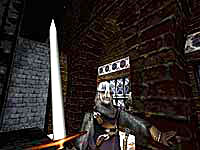 What makes this game so sonically convincing?
Specifically, Looking Glass Studio’s 3D Dark Engine, an AI engine so sophisticated
that it can "hear" how players move on different surfaces and "see"
where they are in respect to light and shadow. A few players have complained that this
engine lacks the stunning visuals generated by the Quake 2 Engine. I would point out,
however, that Quake 2 and its imitators are much more visually oriented games; players
assess their progress through the game by blitzing through levels towards a cumulative
blowout. Thief, on the other hand, is not as linear. Not only do players have to
cover their tracks, they often have to backtrack to finish their missions, relying on
aural as well as visual clues to piece together the layout of a level or to get past
perilous situations. What makes this game so sonically convincing?
Specifically, Looking Glass Studio’s 3D Dark Engine, an AI engine so sophisticated
that it can "hear" how players move on different surfaces and "see"
where they are in respect to light and shadow. A few players have complained that this
engine lacks the stunning visuals generated by the Quake 2 Engine. I would point out,
however, that Quake 2 and its imitators are much more visually oriented games; players
assess their progress through the game by blitzing through levels towards a cumulative
blowout. Thief, on the other hand, is not as linear. Not only do players have to
cover their tracks, they often have to backtrack to finish their missions, relying on
aural as well as visual clues to piece together the layout of a level or to get past
perilous situations.
All in all, while some players may find that Thief
lacks the visual sophistication of other action/adventure games, it provides
players with a beautifully textured and well rendered world pleasing to the eye. The sound
in Thief, though, makes it amazing entertainment. I would buy this game for the
sound and story alone. How often do you get to be the wise-ass Everyman sticking it to the
oppressive establishment from the shadows? The fact that Thief also provides
players with challenging missions and is a blast to play leaves me begging, along with
young Oliver to Mr. Bumble: "Please, sir, I want some more!" -
--Greg Matthews |
